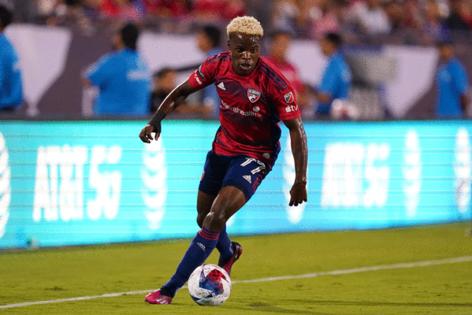Kevin Baxter: Bernard Kamungo a shining example of what a kid from a refugee camp can accomplish
Published in Soccer
LOS ANGELES — The global refugee population topped 16.1 million in 2015, the highest number in more than two decades and larger than the populations of 120 countries, according to the United Nations.
One of those refugees was a skinny boy named Bernard Kamungo, who, for the first 14 years of his life, knew of nothing outside the teeming camp in western Tanzania where he was born to displaced Congolese parents fleeing decades of war in their homeland.
Then a lifeline appeared. His family was approved for resettlement in the U.S. and less than a decade after escaping the camp for a home in Abilene, Texas, Kamungo hasn't just grown into a man, he has become one of the best soccer players in his adopted country. Not only has the FC Dallas midfielder played for the U.S. national team, but he has hopes of suiting up in the Olympic Games this summer.
"That was a dream, man, I won't lie to you," Kamungo said of the day his family left the camp. "Being able to get out of a refugee camp and come to the U.S. is something that I wanted for so long. So when I heard of us coming to the U.S., it was unbelievable. It's a good feeling I'll take with me my whole life."
But that was just the first step on a long and arduous journey. When Kamungo arrived in Abilene, a place he had not previously heard of, he spoke Swahili and French but no English. Soccer, one of the few things he brought with him from the camp, proved to be the icebreaker.
"Growing up, the only thing I had in front of me was a soccer ball," Kamungo remembers.
In the Nyarugusu camp — with more than 150,000 people, one of the largest refugee resettlements in the world — the term soccer ball was more a concept than a reality since the ones Kamungo used were often made from wadded up bags or cloth wrapped around inflated condoms and medical gloves.
Yet that was good enough to provide a temporary break from the monotony of life there.
"There wasn't much to do," he said. "As soon as I started walking, I just loved the game, loved kicking a ball. At the same time, it was a way for me to get away from a lot of a lot of stuff, just kind of connect and keep my head together.
"It never crossed my mind that if I played these games, it might come and help me in the long term."
...continued
©2024 Los Angeles Times. Visit latimes.com. Distributed by Tribune Content Agency, LLC.







Comments